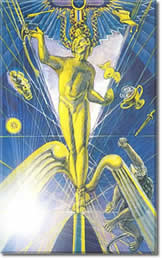 It is important to master languages because they are the means used to express thoughts. They must be considered as a living expression of man. Man’s identity, as we said before, is not in the body but in his thoughts and it is expressed through words or codes, symbols, artistic deeds, conventions or praxis. It is important to master languages because they are the means used to express thoughts. They must be considered as a living expression of man. Man’s identity, as we said before, is not in the body but in his thoughts and it is expressed through words or codes, symbols, artistic deeds, conventions or praxis.
From knowledge to mental liberation, stage 3
Powers of the word
 It is important to master languages because they are the means used to express thoughts. They must be considered as a living expression of man. It is important to master languages because they are the means used to express thoughts. They must be considered as a living expression of man.
Man’s identity, as we said before, is not in the body but in his thoughts and it is expressed through words or codes, symbols, artistic deeds, conventions or praxis.
There are as many languages as the conditions, roles, artistic and scientific talents, cultures, faiths and ideologies of man. Basically a language corresponds to each particular concept created by man. Despite the fact that we all use words, not many people study their meanings and how good they are at evoking.
Behind commonly shared meanings, words hide senses and correspondences that create invisible worlds of knowledge. Sometimes encyclopedias use whole pages to exhaust a word’s meaning, whilst whole libraries are necessary to preserve the spirit of other words. Words such as love and hatred, birth and death, transfiguration and resurrection, sorrow and joy, life and transformation, universe and God, and man, open only partially explored worlds.
There are many words full of meaning and their number increases as their meaning does, through links between words and meanings. For example: the word «intelligence» is often related with «light»; their value can change considerably, though. It can increase if we consider light as a manifestation of the soul, which through intelligence lightens the mind’s shady areas (questions). It can decrease if we don’t understand the difference between intelligence and culture and we consider the former as a sum of notions; we will then relate the word ‘light’ to a light bulb. If we talk about ‘light of intelligence’, on the other hand, every misunderstanding should vanish, because its sense can only be linked to subtle meanings, such as universal intelligence, infinite, universe and God. Every word is alive and its life starts for minds ready to perceive it and penetrate its meanings, reaching the roots of knowledge within.
This is the way to annul the Babel’s tower of bad interpretations, cheap fibs that fill history from its origins.
Learning the radical meanings brings knowledge, in a process of assimilation that reminds us of the digestion process. Indeed, like physical nourishment, knowledge as well regenerates, builds and changes the structure of conscience giving balance to the thinking faculties.
Energy and sonorous effects of the word
Every word is animated by an energy that is its life. When we say a word we transmit the energy produced by its meaning. The quality of the meaning is produced by the identity of the thought and it expresses the value of the thinker. The subtle value of the word is its soul.
The person who receives a subtle meaning (teaching) assimilates ‘knowledge’ through a process of creative knowledge. This process is the arcane of initiatory transmission.
Words are not only meanings, but also sounds. Meanings and sounds (tones) of words can lower or lift up moods and ideas. They can imprison (fabulation) or enlighten the mind, by producing intuition. They can create by affirming or destroy by denying; vice versa, they can destroy by affirming or free by denying.
We must keep this in mind during the process of mental liberation, based on the creative will to generate dominating ideas in the difficult art of visualizing ideas, colors and sounds (see metaphor of the third eye).
Athos A. Altomonte
|


